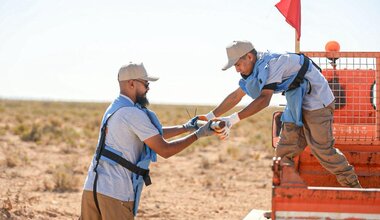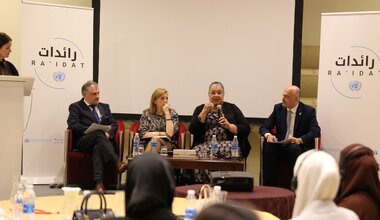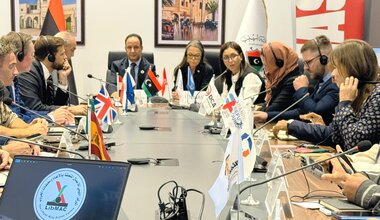Briefing note – 15 May 2015: Civilians Facing Abduction and Torture in Libya
Armed groups across Libya are responsible for abductions of civilians including minors on account of their actual or perceived origin, opinion, family and political affiliation. UNSMIL is calling on all parties to the conflict to immediately release all those held solely on the basis of their identity or opinion and ensure that all those being held are treated humanely.
Civilians are usually seized from their homes and workplaces or at checkpoints and public roads following identity checks. Those abducted are usually at risk of torture and other ill-treatment, and are frequently denied any contact with their families. Some have died in custody, possibly summarily executed or tortured to death.
UNSMIL's reporting is based on documentation including testimonies and official documents such as forensic reports, but often specific sources are not indicated for fear for their safety. In some cases identifiable details of the victims themselves are not disclosed for the same reason. The cases mentioned in this document are only some of those known to UNSMIL, and are illustrated here to show the spread and gravity of the ongoing abuses.
Abductions of civilians have persisted since the escalation of the armed conflict in 2014, but appear to have flared up in western Libya since the intensification of fighting at the doorsteps of the capital in March 2015.
In western Libya, armed groups allied to Libya Dawn as well as their opponents supporting Operation Dignity have carried out retaliatory abductions of civilians, frequently in the aim of securing prisoner exchanges of fighters and civilians taken by their rivals.
Among the victims reported to UNSMIL are at least 10 men and a child abducted from Gheryan and currently detained in Zintan, seemingly without any legal basis or any evidence of their involvement in armed confrontations. The victims include Ahmed Abdelssalam al-Atrash reportedly taken in Wadi al-Hay on 25 March while on the way to Gheryan, along with a worker and the owner of the house where they were going to repair damage. All three are reportedly detained at al-Manara prison in Zintan with no charges.
Gheryan-based armed groups have also abducted civilians on account of their place of origin. For instance, on 10 April, Haitham Sahbi, brother of House of Representative member from Rujban, Salah Sahbi was abducted by an armed group, while trying to buy fuel in Gheryan. He is believed to still be held in Gheryan by an armed group under the command of al-Hamrouni al-Qunsul. Another 12 men from Zintan and Rujban are also reportedly held in Gheryan.
Civilians from Warshafana, many displaced since the fighting in July 2014, are also vulnerable to abductions by armed groups affiliated to Libya Dawn mainly from Janzour and al-Zawiya as well as an armed group under the command of Salah Wadi allied to Libya Dawn. Sixty-four year-old lawyer and father of five al-Mabruk Tantush is among the victims. He was seized on 29 April at a checkpoint, some 27 kilometers from Tripoli, by armed groups affiliated to Libya Dawn.
He is believed to be held in al-Zawiya, purportedly to secure the exchange of a number of men of al-Zawiya origin captured and held by pro-Operation Dignity Warshafana armed groups. Given his age, recent recovery from surgery and diabetes, there are serious concerns regarding his health and access to adequate medical care. Warshafana armed groups allied to Operation Dignity are also accused of abducting civilians on account of their origin, including men from al-Zawiya.
In addition to al-Mabruk Tantush, another lawyer, 65-year-old Ali Fnir of Zintani origin, was reportedly abducted on 13 April by the Sahara armed group affiliated to Libya Dawn. Soon after his capture, pictures of Ali Fnir cuffed to a tree circulated on social media pages. On 23 April, Ali Fnir was placed into the custody of a family from Misrata, whose relative - a fighter - is reportedly held captive in Zintan. Ali Fnir was freed on 10 May in a prisoner exchange between Zintan and Misrata, which included the aforementioned relative of the family from Misrata.
During Ali Fnir's detention by the Sahara armed group, reports emerged of the armed group's willingness to release Ali Fnir in exchange for the freedom of General National Congress member Suleiman al-Zubi. The latter has been held by the Barq al-Nasr armed group, based in Zintan, since his abduction in Tripoli on 20 July 2014, amid concerns about his health and treatment in custody. He has not been able to communicate with his family since his abduction.
Individuals from communities displaced during the 2011 conflict, namely Tawergha and Mashashiya, have also faced a wave of abductions in March and April 2015 on account of their origin and their perceived allegiances in the ongoing conflict. In April, at least four men from Mashashiya were reportedly seized in the area of Aziziya, south of Tripoli, by armed groups affiliated with Operation Dignity and held in Zintan without charge for over a week. Two Tawerghan relatives were taken from the street in Tripoli in April, allegedly by an armed group from Misrata. According to information gathered by UNSMIL, the older man was transferred to a detention facility in Misrata, while the younger one was tortured and shot dead in captivity.
Abdel Raouf al-Zaidi, 19-year-old outspoken social media activist of Zintani origin, also died in custody. Abdel Raouf al-Zaidi was reportedly taken from a Tripoli street on 23 April by an armed group affiliated to Libya Dawn. UNSMIL received information that he was held at the Abu Salim detention facility, under the control of an armed group commanded by Abdel Ghani al-Kikli (Ghenewa), at least until 26 April. He was transferred to the Abu Salim Emergency Hospital some three days later. On 3 May, his family collected his body. This is not the first time UNSMIL has documented deaths in custody at the hands of the Abu Salim armed group. UNSMIL also issued a joint report with the OHCHR on 25 March 2015 outlining threats facing human rights defenders and other civil society activists including assassinations, abductions and torture.
In eastern Libya, forces loyal to Operation Dignity continue to abduct and detain civilians suspected of sympathizing with the Benghazi Revolutionaries' Shura Council (BRSC) or on account of their origin or relatives' involvement in fighting. They are held in a number of facilities including the Department of Criminal Investigations in Benghazi and Marj, the Birsis detention facility, Rajma facility and Gernada Prison (military wing) amid concerns of torture and other ill-treatment, including cases resulting in the death of the death of the victim.
Among the victims reported to UNSMIL are a minor taken on account of his perceived opposition to Operation Dignity; brothers held due to their relative's engagement in fighting with the BRSC; and a university student. Former detainees as well as families of individuals still detained requested the omission of names and any identifying information in fear of reprisals. Those released reported beatings, periods in solitary confinement, restraining in contorted positions, as well as squalid and unhygienic detention conditions with no potable water and limited access to sanitary facilities.
Some of those held have reportedly died following torture, including 29-year-old Rami Rajab al-Fitouri, who was taken from his Benghazi home on 11 March and reportedly held at the Department of Criminal Investigations in Benghazi. His family collected his bruised body on 22 March.
Among those still missing is public prosecutor from the South Court of Benghazi Abdel Nasser al-Jaroushi. UNSMIL received reports that the Shuhada al-Zawiya armed group seized him from a street in central Benghazi on 20 October 2014. He remains deprived of his liberty to date. The Ministry of Justice informed UNSMIL that he is held in Marj in an unofficial detention facility.
Of particular concern is the appearance of a number of abducted individuals in televised "confessions" aired on Libya Awalan channel "admitting" to engaging in fighting and murder. Bruises and swellings are visible on those filmed at the Birsis detention facility.
Armed groups affiliated to the BRSC are also responsible for abductions of civilians on the basis of their actual or perceived political or religious affiliations and family connections. The fate and whereabouts of those captured by the BRSC, including prisoners taken from Bouhmeima military prison in October 2014, are unknown, amid serious concerns for their lives and safety. Others abducted by groups affiliated to the BRSC include Jamal Haroun, a 23-year-old university student who was seized from his family farm along with a Sudanese employee in October 2014, seemingly because of his and his family's opposition to the BRSC. The Sudanese employee was released about a week later, but Jamal Haroun's fate and whereabouts remain unknown.
Abductions of civilians are perpetrated against the backdrop of ongoing fighting, deepening political crisis, terrorist attacks, the spread of the so-called Islamic State and other extremist groups, lawlessness and the breakdown of the criminal justice system, leaving victims and families with few avenues for redress.
Hostage-taking of civilians with the aim of forcing a third party to do or to abstain from doing any act as an explicit or implicit condition for the release of the hostage is a war crime, prohibited by international humanitarian law. Torture and murder are also war crimes. Those responsible for committing, ordering or failing to prevent such crimes when in a position to do so are criminally liable, including in front of the International Criminal Court.
Non-compliance with international human rights and humanitarian law by one party to the conflict does not absolve other parties from their obligations, and calls for accountability for those responsible for committing war crimes and other crimes under international law.
Noting that a number of prisoner exchanges have taken place in recent months and days, UNSMIL calls on all those with effective control on the ground to refrain from abducting civilians on the basis of their identity or opinion; to immediately release all those held on such grounds; and to ensure the well-being of anyone deprived of their liberty.
UNSMIL calls specifically on the Ministry of Justice and the public prosecution to ensure that detainees are protected from torture, not held without legal basis, and transferred to official facilities if they face proper charges.
UNSMIL further recalls commitments undertaken by participants in the Libyan political dialogue to support confidence building measures, including working towards addressing the situation of detainees and missing persons. It welcomes in this context the cooperation it has received from a number of municipalities in ascertaining the status and whereabouts of a number of civilians abducted, and urges municipal leaders to increase their efforts to secure respect for the rights of civilians regardless of their identity.
UNSMIL has repeatedly appealed to all sides of the conflict to cease all armed hostilities and engage in an inclusive political dialogue to build a state based on the respect of human rights, democracy and the rule of law. UNSMIL continues to engage with all sides to end the fighting and ensure that civilians are protected.
 United Nations Peacekeeping
United Nations Peacekeeping UN
UN








